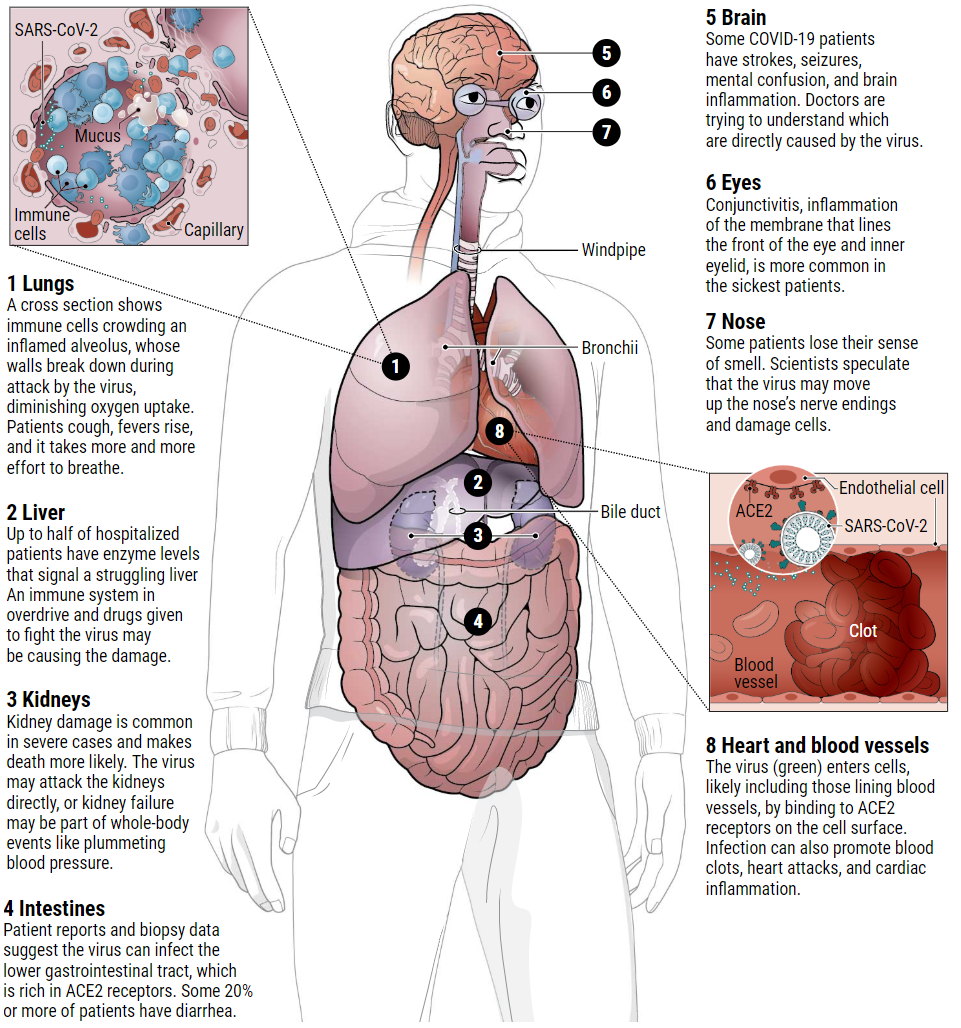每日外闻76
How does coronavirus kill? Clinicians trace a ferocious rampage through the body, from brain to toes
How does coronavirus kill? -3
新型冠状病毒对人体的影响
严重情况下,SARS-CoV-2会进入肺部,对肺部造成严重损害。但是这种病毒,或人体对它的反应,会伤害许多其他器官。科学家们才刚刚开始探索这种危害的范围和性质。

一些临床医生怀疑,许多重症患者病情恶化的驱动力是免疫系统灾难性的过度反应,这种反应被称为“细胞因子风暴”,其他病毒感染也会引发这种风暴。细胞因子是引导健康免疫反应的化学信号分子;但在细胞因子风暴中,某些细胞因子的水平飙升,远远超过所需水平,免疫细胞开始攻击健康组织。随之血管破裂,血压下降,血栓形成,灾难性的器官衰竭会随之而来。
一些研究表明,住院的COVID-19患者血液中这些炎症诱导细胞因子水平升高。坦普尔大学医院(Temple University Hospital)负责照料19名covid19患者的肺科医生杰米•加菲尔德(Jamie Garfield)表示:“这种疾病的实际发病率和死亡率可能是由人体对这种病毒的过度炎症反应驱动的。”
但其他人对这种说法并不信服。斯坦福大学医学院(Stanford University School of Medicine)肺部危重症护理医师约瑟夫•莱维特(Joseph Levitt)表示:“人们似乎很快就将COVID-19与这些炎症反应联系了起来,但我还没有看到令人信服的数据证明这一点。”
他还担心抑制细胞因子反应的努力可能会适得其反。针对特定细胞因子的几种药物已经进入了COVID-19患者的临床试验。但是莱维特担心这些药物可能会抑制人体对抗病毒所需的免疫反应。莱维特说:“这种针对细胞因子的药物允许更多的病毒复制,这确实存在风险。”
与此同时,其他科学家正在把注意力集中在一个完全不同的器官系统上,他们说,这个系统导致了一些病人的病情迅速恶化:心脏和血管系统。
An invader’s impact
In serious cases, SARS-CoV-2 lands in the lungs and can do deep damage there. But the virus, or the body’s response to it, can injure many other organs. Scientists are just beginning to probe the scope and nature of that harm.

Some clinicians suspect the driving force in many gravely ill patients’ downhill trajectories is a disastrous overreaction of the immune system known as a “cytokine storm,” which other viral infections are known to trigger. Cytokines are chemical signaling molecules that guide a healthy immune response; but in a cytokine storm, levels of certain cytokines soar far beyond what’s needed, and immune cells start to attack healthy tissues. Blood vessels leak, blood pressure drops, clots form, and catastrophic organ failure can ensue.
Some studies have shown elevated levels of these inflammation-inducing cytokines in the blood of hospitalized COVID-19 patients. “The real morbidity and mortality of this disease is probably driven by this out of proportion inflammatory response to the virus,” says Jamie Garfield, a pulmonologist who cares for COVID-19 patients at Temple University Hospital.
But others aren’t convinced. “There seems to have been a quick move to associate COVID-19 with these hyperinflammatory states. I haven’t really seen convincing data that that is the case,” says Joseph Levitt, a pulmonary critical care physician at the Stanford University School of Medicine.
He’s also worried that efforts to dampen a cytokine response could backfire. Several drugs targeting specific cytokines are in clinical trials in COVID-19 patients. But Levitt fears those drugs may suppress the immune response that the body needs to fight off the virus. “There’s a real risk that we allow more viral replication,” Levitt says.
Meanwhile, other scientists are zeroing in on an entirely different organ system that they say is driving some patients’ rapid deterioration: the heart and blood vessels.
See you tomorrow


